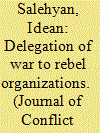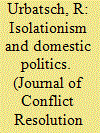| Srl | Item |
| 1 |
ID:
096565


|
|
|
|
|
| Publication |
2010.
|
| Summary/Abstract |
States in an international dispute sometimes choose to attack their enemies with their own military forces but other times choose to empower domestic insurgent groups. What explains the decision to act through rebel proxies rather than directly engage a rival? Theories and empirical analyses of international conflict have adopted a state-centric bias, ignoring the substitution between direct uses of force and indirect action through rebel organizations. This note examines the decision to delegate conflict to rebels through the lens of principal-agent theory. While states support rebel groups to forgo some of the costs of conflict, they also lose a degree of foreign policy autonomy. Preliminary evidence of conflict delegation is presented, along with a number of empirically testable propositions. Finally, the consequences of delegation from the rebels' perspective are explored. This framework serves as a starting point for future research on rebel-patron interactions.
|
|
|
|
|
|
|
|
|
|
|
|
|
|
|
|
| 2 |
ID:
096563


|
|
|
|
|
| Publication |
2010.
|
| Summary/Abstract |
Isolationism has long been seen as a reaction against domestic economic conditions or a threatening international environment, but domestic politics could equally spur such a reaction. Disagreement with current foreign policy or opposition to political parties directing foreign policy may provoke negative feelings on the general prospect of international engagement. Some of what appears to be isolationism, then, is not a universal rejection of international intervention but is instead contingent on partisan control of the executive. Data from the American National Election Studies confirms this: copartisans of the president are substantially less likely to agree with isolationist statements or simultaneously to support isolationism and specific interventionist policies. In addition to further illuminating the sources of public opinion about foreign policy, these findings suggest that some common measures of isolationism may not measure what they intend to measure.
|
|
|
|
|
|
|
|
|
|
|
|
|
|
|
|
| 3 |
ID:
096560


|
|
|
|
|
| Publication |
2010.
|
| Summary/Abstract |
Tsebelis' veto players theory predicts that legislative veto players constrain the executive's political decisions because their approval is needed to implement policy change. This study extends the veto players argument into international conflict literature, specifically in regard to legislative constraints emanating from the number of legislative veto players, their policy preferences, and their internal cohesion. A cross-sectional, time-series dyadic data analysis shows that, in general, an increase of legislative constraints notably reduces the likelihood of the onset of militarized interstate disputes. However, while legislative constraints in democratic and mixed dyads are likely to discourage democratic executives' use of force, those in autocratic dyads do not produce effective pacifying effects.
|
|
|
|
|
|
|
|
|
|
|
|
|
|
|
|
| 4 |
ID:
096558


|
|
|
|
|
| Publication |
2010.
|
| Summary/Abstract |
Truth telling has come to play a pivotal role in postconflict reconciliation processes around the world. A common claim is that truth telling is healing and will lead to reconciliation. The present study applies recent psychological research to this issue by examining whether witnessing in the gacaca, the Rwandan village tribunals for truth and reconciliation after the 1994 genocide, was beneficial for psychological health. The results from the multistage, stratified cluster random survey of 1,200 Rwandans demonstrate that gacaca witnesses suffer from higher levels of depression and PTSD than do nonwitnesses, also when controlling for important predictors of psychological ill health. Furthermore, longer exposure to truth telling has not lowered the levels of psychological ill health, nor has the prevalence of depression and PTSD decreased over time. This study strongly challenges the claim that truth telling is healing and presents a novel understanding of the complexity of truth-telling processes in postconflict peace building.
|
|
|
|
|
|
|
|
|
|
|
|
|
|
|
|
| 5 |
ID:
096556


|
|
|
|
|
| Publication |
2010.
|
| Summary/Abstract |
Political actors sometimes make public commitments not to negotiate with adversaries whom they label as being beneath diplomacy. Such commitments are sometimes made even as they are being broken. Why do actors sometimes publicly denounce adversaries with whom they intend to negotiate? What effect does such prenegotiation rhetoric have on the prospects for successful negotiated settlements? In this paper, the authors present a novel game-theoretic model of conflict bargaining, in which actors can make public commitments not to negotiate before deciding whether to engage in secret negotiations with adversaries. The authors model such commitments as affecting actors' audience costs; a denunciation increases an actor's motivation to reach a negotiated settlement if negotiations are undertaken. Although such a decision weakens an actor's bargaining power, in equilibrium actors sometimes publicly denounce their counterparts. The authors present and interpret equilibrium behavior in their model and discuss the implications of their results for future research.
|
|
|
|
|
|
|
|
|
|
|
|
|
|
|
|